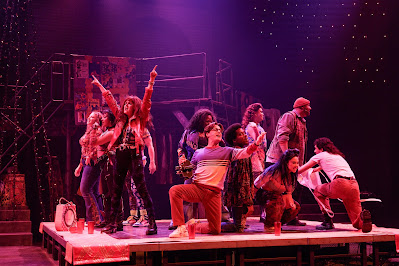Reviewed by James Karas
On The Razzle is a classic farce that has a big edge over many such examples in the genre. It is written by Tom Stoppard. It does not have all the verbal pyrotechnics, philosophical arguments and brilliance of many of his other plays but it is still an exquisite piece of theatre. It is an adaption of a farce by Johann Nestroy but Stoppard uses only the plot outline. The language is all his own.
Artistic Director Tim Carroll’s choice is sound but the production itself, whatever its virtues, has one fundamental flaw: it is not funny enough. The plot has the usual complications of a farce and of course it requires speed in speech, high mobility and endless shenanigans to keep the audience amused and preferably roaring with laughter.
The day I saw the production there were several cast changes and for some reason the show did not get fired up to its potential, especially in the first half. It picked up some speed after the intermission and produced some laughter and at least acknowledgement of the verbal humour from the audience.
The plot borrowed from Nestroy should be familiar to most. It was adopted by Thornton Wilder as The Merchant of Yonkers and later as The Matchmaker which became Broadway’s Hello, Dolly!
Zangler (Ric Reid) is the owner of an upscale store in a village near Vienna and he wants to stop the progress of youthful love between his niece Marie (Lindsay Wu) and the penniless Sonders (Drew Plummer). He sends her to his sister-in-law Fraulein Blumenblatt (Tara Rosling) in Vienna to prevent anything untoward happening between those two lovebirds.
Accompanied by his new fast-talking servant Melchior (Jonathan Tan) Zangler is going to Vienna to marry Madame Knorr (Claire Julien) who owns a fancy-dress shop. There is more: Zangler assigns management of his business to his bright-eyed clerk Weinberl (Mike Nadajewski) and the not-too-swift Christopher (Kristi Frank). The two decide to seek adventure in Vienna and guess who will run into whom. The farcical elements are all in place.
Puns, double-entendres, mangled words are abundant. Weinberl and Christopher end up in Madame Knorr’s shop and he picks up a Scottish cape marked for Mrs. Fischer. He pretends to be the newly married husband of Mrs. Fischer (Elodie Gillett). The store clerk Philippine (Alexandra Gratton) goes to fetch Madame Knorr, the dressmaker, and Christopher comments that she is probably hemming and hawing. Mrs. Fischer and Weinberl pretend to have been married for three days while Madame Knorr keeps gushing and the audience is treated to double-entendres. Weinberl says he may have been a little forward in marrying her and Mrs. Fischer replies that he is in danger of meeting himself coming back. Weinberl expresses reluctance about buying the Scottish cape because the tartan fad is played out. “Plaid out – such a sense of humour” replies Mrs. Fischer.
The play is set in Zangler’s shop, in Madame Knorr’s fancy dress shop, The Imperial Gardens Café, Miss Blumenblatt’s home and other scenes. There are working class costumes and high-end Viennese society attires, especially dresses. Christina Poddubiuk does splendid work in making the wonderful sets that can be changed work smoothly.
The plot with all its complications is pure 19th century farce elevated by Stoppard’s colourful language but neither aspect seems to work to produce gales of laughter. I can’t blame the cast. Frank and Nadajewski do a good job as slapstick comics and Ric Reid as Zangler is straight out of operetta. Elodie Gillet as Mrs. Fischer and Claire Julien as Madame Knorr are high society ladies who provide comic business.
The minor characters such as the Tailor and the German Man (Jason Cadieux), the Coachman and the Scotsman (Patrick Galligan), Lisette, Scotswoman and Ragamuffin (Alexandra Gratton) the Belgian and the Constable (Graeme Kitagawa) are good for some laughs. But these parts do not add up to a satisfactory whole. Despite some funny moments, director Craig Hall seems to have been unable to orchestrate a coherent, funny production.
_______________________
On The Razzle by Tom Stoppard continues on selected dates until October 8, 2023,
at the Royal George Theatre, Niagara-on-the-Lake, Ontario. www.shawfest.ca


%20as%20Beatrice%20and%20Graham%20Abbey%20as%20Benedick%20in%20Much%20Ado.%20Stratford%20Festival%202023.%20Photo%20by%20David%20Hou.%20DHou-1927.jpg)
%20and%20A.%20Edwards-Crewe%20(right)%20with%20members%20of%20the%20company%20in%20Much%20Ado.%20Stratford%20Festival%202023.%20Photo%20by%20D.%20Hou.%20DHou-1520.jpg)


.jpg)

%20as%20Marta%20Di%20Spelta%20with%20members%20of%20the%20company%20in%20Grand%20Magic.%20Stratford%20Festival%202023.%20Photo%20by%20David%20Hou.%20DHou-320.jpg)




%20and%20Paul%20Gross%20with%20members%20of%20the%20company%20in%20King%20Lear.%20Stratford%20Festival%202023.%20Photo%20by%20David%20Hou.%20DHou-164.jpg)